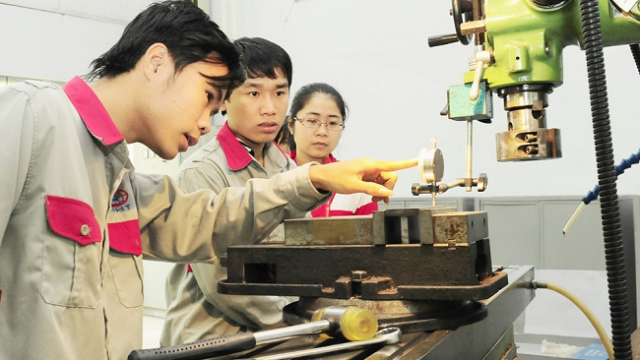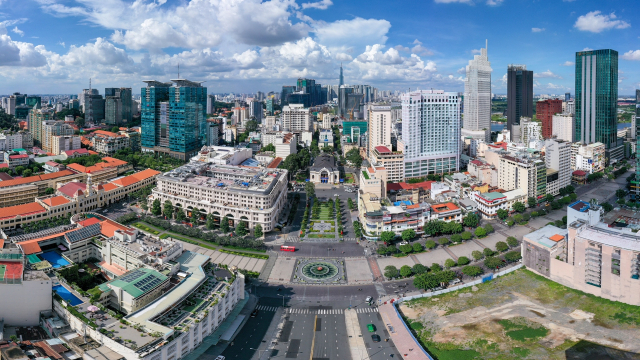Leader Talk
Vietnam's population of working age peaks this year, implying its labor supply
Aging population, one of the four specific megatrends impacting on Vietnam, has many negative implications for Vietnam’s labor supply, long-term productivity growth, pension and social assistance system, according to country director of the World Bank Group in Vietnam Ousmane Dione.

Currently, Vietnam’s sustainable and competitive development are affected significantly by four specific megatrends that are regional or global in nature and are sustained and transformational forces that can re-define our world by changing the rules of the game.
One of the megatrends that the leader of the World Bank Group in Vietnam (World Bank) pointed out in the conference themed on enhancing competitiveness, realizing sustainable development goals held yesterday in Hanoi is the aging population.
He said that Vietnam is about to experience the fastest pace of population aging in history. The share of the population that is of working age peaked this year and will now start to decline. The share of the population aged 65 or over was 6.5 per cent last year, and that is expected to reach 21 per cent by 2050. That means one in every five people will be elderly.
Accordingly, this would lead to many negative implications for Vietnam’s labor supply, long-term productivity growth, the pension and social assistance system. On the other hand, the care industry will likely expand to cater for the elderly population, as is currently occurring in developed Asia, Europe, and the U.S.
Besides, Vietnam would be affected by the current shifting trade patterns. Trade is slowing, which generates greater competition for countries like Vietnam. Vietnam has benefited from a robust FDI sector that has directly employed about 2.4 million workers.
Yet neighboring countries, such as Cambodia and Myanmar, are emerging as competitors for low-skilled production jobs. In some cases, rapid technological change is even resulting in restoring of jobs back to home countries of FDI.
"Vietnam can harness the shifting trade patterns to its advantage. For example, there will be an increasing demand for manufactured goods from an expanding consumer class in Asia," said Ousmane Dione.
"In Hanoi, there are shopping malls like Aeon, Royal City, and Lotte packed with families on the weekends. Middle-class families now have time and money for shopping and leisure activities, and this will only expand in the coming years," he added.
In addition, 21st-century workers require a more complex set of skills than in the past due to the rise of the knowledge economy and automation. This is being driven by automation, where machines are taking over for manual and routine jobs, as well as an increase in demand for products and services driven by the expanding consumer class.
For example, there will be less demand for physical laborers, such as loaders at shipping ports. Instead, workers with computer literacy and logistics skills will be needed to ensure that shipments are managed accurately and on time.
A critical challenge in Vietnam that Ousmane Dione pointed out is that only eight per cent of the labor force has a university education, which is insufficient to make the leap into the knowledge economy. Ethnic minorities, older workers, and pockets of youth in Vietnam are particularly vulnerable.
He said that while an economy that is more technology intensive has the potential to open up opportunities for better quality jobs, workers need to be equipped with the right skills mix to ride this wave.
Climate change is also an important factor that needs to be focused on, according to the leader of the World Bank. In the context of this megatrend, Ousmane Dione said that transformations in how we produce and conduct business are needed, and they are needed now.
For example, primary producers could shift to drought, or flood, resistant crops or livestock. Tourism operators could diversify into regions that are less threatened by rising sea levels or high temperatures.
According to country director of the World Bank Group in Vietnam Ousmane Dione, for Vietnam to be resilient to megatrends, the four types of capital including institutional, human, physical, and natural ones must be developed and deployed efficiently, equitably, and effectively.
"We must lower the cost of developing all types of capital, ensure that everyone has access to them, and produce the highest quality possible," said Ousmane Dione.
EuroCham recommends reshuffling Vietnam's manpower towards EVFTA
Vietnam turns semiconductor vision into action
The global semiconductor industry is being reshaped by geopolitical tensions, shifting supply chains, and the surge of digital technologies.
Cutting red tape in APA approvals to speed up tax negotiations
The change in APA approval authority is expected to shorten processing time and enhance business proactiveness in international tax negotiations.
Enterprise cybersecurity is under threat from the inside
As hybrid cloud systems grow more complex, Vietnamese enterprises are struggling to detect cybersecurity threats moving laterally within their own networks.
Breakthrough for the international financial center ambition
The submission of the draft resolution on Vietnam’s international financial center to the National Assembly heralds a new developmental era for the country.
How leadership philosophy redefines hospitality in Nha Trang
More than just running a 5-star resort, Kristian Petersen is redefining the art of hospitality with a humane and sustainable leadership philosophy.
When organic becomes an inspiring wellbeing lifestyle
For Tyna Huynh, co-founder of Drinkizz, organic is not just a food choice but a way of life that fosters a deep connection between people, nature and community.










































